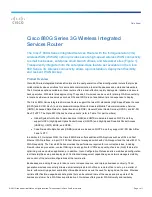
300Mbps Wireless-N Broadband Router
User Manual
36
set MTU manually, and you should leave this value in the 1200 to 1500 range. If the value
you set is not in accord with the value ISP provide, it may causes some problems, such as
fail to send Email, or fail to browse website. So if that happen, you can contact your ISP for
more information and correct your router’s MTU value.
Primary DNS: The DNS server translates domain or website names into IP address, input
the most common DNS server address you used or provided by your ISP.
Secondary DNS: Input IP address of a backup DNS server or you can leave this field
blank.
4.4.1.2. Wireless Access
Figure 4-19
SSID: SSID: SSID (Service Set Identifier) is your wireless network's name shared among
all points in a wireless network. The SSID must be identical for all devices in the wireless
network. It is case-sensitive and must not exceed 32 characters. Make sure all points in the
wireless network have the same SSID. For added security, you should change the default
SSID to a unique name.
Authentication Type: “None” means do not encrypt wireless data.
Internet Access Type: Ask for your ISP to get the correct access type.
IP: The IP address you obtained after connect to the Internet, if you haven’t connected to
the Internet yet, this field is 0.0.0.0.
Subnet Mask: The Subnet mask you obtained after connect to the Internet, if you haven’t
connected to Internet yet, this field is 0.0.0.0.
Gateway: The IP address of Default gateway you obtained after connect to the Internet, if
you haven’t connected to Internet yet, this field is 0.0.0.0.
MTU: The MTU (Maximum Transmission Unit) setting specifies the largest packet size
permitted for network transmission. Most DSL users should use the value 1492.You can
















































